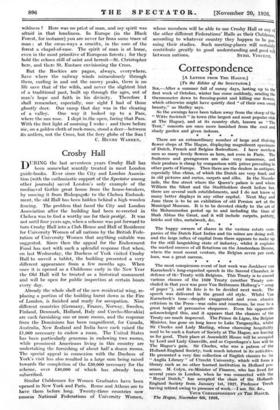Correspondence
[A LETTER FROM THE HAGUE.]
[To the Editor of the SPECTATOR.] SIR,—After a summer full of sunny days, lasting up to the first week of October, winter has come suddenly, sending the thermometer down to freezing-point and killing our flowers, which otherwise might have quietly died " of their own sweet beauty," as Shelley says.
So the awnings have been taken away from the stoep of the " Witte Societeit " in town (the largest and most popular club at The Hague), and at its country club, known as " The Tent," concerts are once more banished from the cool and shady garden and given indoors.
* * * * There are an extraordinary number of large and thriving flower shops at The Hague, displaying magnificent specimens
of Dutch, French and Belgian floriculture. I have nowhere seen so many lovely flowers as here, not even in Paris. The fruiterers and greengrocers are also very numerous, and their produce is cheap by comparison with prices prevailing in other parts of Europe. Then there are the dealers in antiques, especially blue china, of which the Dutch are very fond, and in old pictures and curios, carpets and silks. In the Noorde- inde, the fine street where the Queen's palace is and where William the Silent and the Stadtholders dwelt before her, there are several such establishments, and I do not know of many better displays in any other capital. Next May and June there is to be an exhibition of old Persian art at the Municipal Museum. It is to be devoted chiefly to the art of the Mohammedan period up to and including the time of Shah Abbas the Great, and it will include carpets, pottery, bricks and tiles, metalwork, &c.
* * * * The happy owners of shares in the various estate com-
panies of the Dutch East Indies and tin mines are doing well, and the large_influx of capital from there appears to make up for the still languishing state of industry, whilst it explains the marked success of all flotations on the Amsterdam Bourse, where the most recent venture, the Belgian seven per cent. loan, was a great success. * * * * The most conspicuous event of last week was Jonkheer van
Karnebeek's long-expected speech in the Second Chamber, in defence of tin Treaty with Belgium. This Treaty is to amend various clauses of the 1889 Treaty (another Treaty con- cluded in that year was poor Von Bethmann Hollweg's " scrap of paper "), and its fate is to be decided next week. The speech was delivered in the grand old style. Whilst Van Karnebeek's tone—despite exaggerated and even abusive criticism in the Press—was calm and courteous, he rose to a great height of persuasive eloquence. Even his opponents acknowledged this, and it appears that the chances of the Treaty are much improved. The Prince de Ligne, the Belgian Minister, has gone on long leave to Lake Tanganyika, whilst Sir, Charles and Lady Marling, whose charming hospitality used to be such a feature of Society at The Hague, are leaving us for good. Their place at Assendelft House will be occupied by Lord and Lady Granville, and so Copenhagen's loss will be The Hague's gain. Sir Charles, who was a patron of the Holland-England Society, took much interest in its activities. He presented a very fine collection of English classics to she " Anglia Library " of Utrecht University, which will form a library such as no other learned institution in Holland pos- sesses. M. Colyn, ex-Minister of Finance, who has lived for several years in London, when he was connected with the "'Royal Dutch," has accepted –the chair of the Holland. England Society froin January 1st,- 1927, Professor Treub having retired owing to pressure of work.—I am, Sir, &e.,






























































 Previous page
Previous page